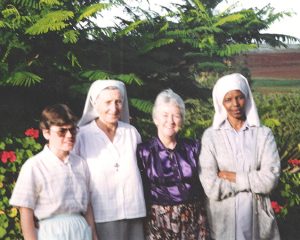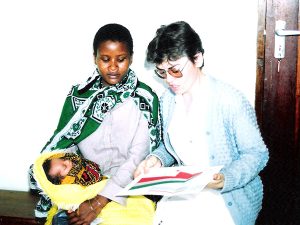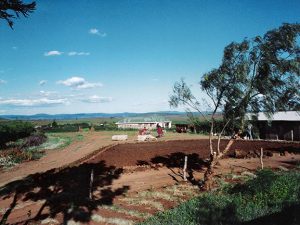Making New Paths
By Sr. Helen McKenna, MMM
“We go… where human need is greatest”.
(MMM Mission Statement)
Mother Mary, our foundress, prior to World War One, was a young lady of an Aristocratic family living in the suburbs of Dublin. Her daily activities would have included organising private garden parties, playing tennis etc. Domestic responsibilities would have been taken care of by housekeepers and maids.

It was only with the advent of the first world war that a wider and more disturbing world intruded into her life. Her brothers volunteered to join the army. Marie, as she was known then, chose to train and work as a VAD nurse. She was sent to Malta to care for injured soldiers. Marie chose to change the direction of her life to meet a need. She and the MMM that she founded, have continued to ‘change direction’ to meet the needs of our times.
Marie was invited to Nigeria in 1922 expecting to work in a medical setting, only to find herself being asked to teach. She accepted that role but moved when it was appropriate back towards the medical ministry. Seeing the high rate of maternal and child mortality and morbidity while in Nigeria, she dreamed of forming a congregation, dedicated to the care of Mothers and Children.
Even after the congregation was founded and sisters began to work in Nigeria, another crisis needed attention; leprosy. So, in/near several of our hospitals, provision was made to take care of people with leprosy. In more recent years the problem with VVF became the focus of our work in several countries; Nigeria, Angola and Uganda to name only a few. Education to prevent these horrendous human conditions has and still is a big part of MMM Ministry.
In my own time working in Tanzania, I have seen the need to change paths to respond to the ‘greatest need’. We opened a new mission in Nangwa in Mbulu Diocese in 1985. We received medicines on a monthly basis called ‘Essential Drugs’. Within a short time, people from far beyond our catchment area made their way to our Dispensary and Outreach Centres. This led to a shortage of medicines before the end of the month. We had to look for alternatives to fill the gap. We turned to Reflexology using a book on the topic. Over time, I got an opportunity to take a full year’s diploma course to qualify as a Reflexologist and use it to this day, specialising in Hand Reflexology.
While serving the local community in Nangwa Tanzania, HIV/Aids appeared around 1990. Our dream had been to move further ‘into the bush’ to provide medical care for neglected and often despised Barabaig people. When Aids reared its head, we discerned and decided the most urgent need was to set up an intense education program to prevent HIV infection. We also set up a counselling program for couples who tested positive for Sexually Transmitted Diseases, a forerunner to Aids. We were also funded by SCIAF (The Scottish Catholic International Aid Fund). With their funds we developed a diocesan-wide program in each Dispensary in the diocese of Mbulu.
In the 90’s, following the decision of the Tanzanian Government to join the International Monetary Fund (IMF), food started coming in from Europe. I remember the first time Coca Cola, white bread and even bacon and sausages appeared in the shops. At first we were excited to see food from home but before long, it was clear that this European food was not better than the available food in Tanzania.


I took time to learn the advantages of good local food and even more so how the food was processed. Dehusking cereal became possible when milling with machines was introduced. This meant that the best part of the cereal was removed and fed to livestock. Again, I changed my manner of working and started teaching various groups on Nutrition. It was challenging to convince some people that their own food was actually superior quality to the new European novelty food. I continue to focus on this important aspect of Nutritional Education knowing that it would have long-term consequences for the people.
In summary, I would say that in MMM, we don’t follow the paths but we make new paths. We change and adapt our ministry in order to ‘go … where human need is greatest’.
